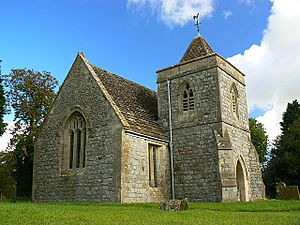St Nicholas's Church, Berwick Bassett facts for kids
Quick facts for kids St Nicholas's Church |
|
|---|---|
 |
|
| Location | Berwick Bassett, Wiltshire England |
| Built | 15th century |
|
Listed Building – Grade II*
|
|
| Designated | 27 February 1958 |
| Reference no. | 1365565 |
| Lua error in Module:Location_map at line 420: attempt to index field 'wikibase' (a nil value). | |
St Nicholas's Church is a very old and special church located in a village called Berwick Bassett in Wiltshire, England. It was built a long, long time ago, starting in the early 1200s! Today, it's looked after by a group called the Churches Conservation Trust, which helps protect historic churches. Even though it's an old building, church services are still held there a few times each year. This church is so important that it's officially recognized as a Grade II* listed building, meaning it's a really significant historical place. It was officially declared a "redundant church" in 1972, which means it was no longer needed for regular parish services, and was given to the Trust the following year.
Contents
History and Features of St Nicholas's Church
You can only reach St Nicholas's Church by walking on a special path. The oldest part of the church, called the chancel (where the altar is), was built between 1199 and 1221 using red bricks. The main part of the church, the nave (where people sit), was added later in the 1300s. It was built with large, hard stones called sarsen stones.
Inside the Church
Inside, you'll find a font (a basin for baptisms) from the 1200s and a beautiful wooden screen called a rood screen from the 1400s. The pulpit (where the preacher stands), the altar rail, and the pews (church benches) were added in the 1800s. There's also a special small basin called a piscina with a clover-like shape, which was used for washing the communion vessels (cups and plates used in services).
Old Memorials and Restoration
You can also see old wall tablets inside the church that remember people like Henry Webb (who passed away in 1776), John Nalder (1794), and Elizabeth Nalder (1835). In the 1660s, a famous writer named John Aubrey visited the church and wrote about the memorials and tombs he saw.
In 1857, the church had a big makeover, known as a Victorian restoration. This work was led by an architect named Thomas Henry Wyatt. During this time, the original wooden tower was replaced with the stone tower you see today, which holds three bells from the 1600s. The church walls were also covered with a smooth finish and painted white.
Church Connections Over Time
For many years, St Nicholas's Church was connected with other nearby churches. In 1865, its church area, called a benefice, joined with that of Winterbourne Monkton. Later, in 1929, this connection ended, and Berwick's church joined with Winterbourne Bassett instead.
In 1952, the connection was changed again. This time, the priest who looked after the churches of Avebury and Winterbourne Monkton also became responsible for Berwick. By 1970, these three church areas were officially joined together. In 1975, a new system called a "team ministry" was created for the whole area, which became known as the Upper Kennet benefice.
See also
 | Delilah Pierce |
 | Gordon Parks |
 | Augusta Savage |
 | Charles Ethan Porter |

